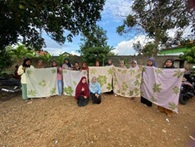Merajut Kemandirian dengan Bimbingan Produksi dan Pemasaran Syariah Batik Ecoprint pada Kelompok Wanita Keluarga Pra Sejahtera di Loktabat Utara Banjarbaru Building Self-Reliance through Sharia-Based Production and Marketing Guidance for Ecoprint Batik in Underprivileged Women’s Groups in Loktabat Utara, Banjarbaru
Main Article Content
Abstract
The community empowerment program based on Nile tilapia cultivation using the biostimulant RAS system was expected to enhance participants' economic independence. Key challenges included limited access to information, education, and technology, alongside a lack of business management support. The program aimed to address these issues and positively impact the welfare of the disability community. Conducted under the title "Productive Efforts for Sensory (Hearing Impairment/Deafness) and Physical Disabilities through Nile Tilapia Cultivation Using a Circular Biostimulant RAS System in the Teras Inklusi Community," the activity used a Participatory Rural Appraisal (PRA) approach. The installation of circular RAS (Recirculating Aquaculture System) ponds in the field was completed as planned, with all system components, including circular ponds, filtration systems, and water distribution pipes, properly installed and functioning as expected. Effective coordination between the PKM team and partners resulted in no significant obstacles during installation. The training successfully enhanced participants' understanding and competencies, as evaluation results showed an increase in the "Good" category from 25% in the pre-test to 85% in the post-test, with no participants remaining in the "Poor" category after training.
Downloads
Article Details

This work is licensed under a Creative Commons Attribution-ShareAlike 4.0 International License.
Authors who publish with this journal agree to the following terms:
- Any article on the copyright is retained by the author(s).
- Author grant the journal, right of first publication with the work simultaneously licensed under a Creative Commons Attribution License that allows others to share work with acknowledgment of the work authors and initial publications in this journal.
- Authors are able to enter into a separate, additional contractual arrangements for non-exclusive distribution of published articles of work (eg, post-institutional repository) or publish it in a book, with acknowledgment of its initial publication in this journal.
- Authors are permitted and encouraged to post their work online (e.g., in institutional repositories or on their websites) prior to and during the submission process, as can lead to productive exchanges, as well as earlier and greater citation of published work.
- The article and any associated published material is distributed under the Creative Commons Attribution-ShareAlike 4.0 International License
References
Azhari, Septian Cahya, dan Ely Satiyasih Rosali. 2022. “PKH Shop sebagai Pemberdayaan Masyarakat untuk Meningkatkan Perekonomian Keluarga Prasejahtera Penerima Bantuan Sosial PKH Melalui Team Based Project Pejuang Muda Kementerian Sosial di Kecamatan Banjarsari Kabupaten Ciamis. Jurnal Pengabdian Masyarakat (abdira), 2(2):23–29. https://doi.org/10.31004/abdira.v2i2.122
Fakhrurozi, Moh. 2023. Peranan Pemerintah dan Strategi Pemasaran terhadap Penjualan UMKM Ecoprint Yasmin Wiwid Lampung. REMIK: Riset dan E-Jurnal Manajemen Informatika Komputer, 7(3):1676–86. https://doi.org/10.52655/khg.v6i2.83
Khilmiyah, Akif, dan Arni Surwanti. 2021. Pemberdayaan Ekonomi Aktivis Aisyiyah Melalui Pelatihan Ecoprint Ramah Lingkungan. Prosiding Seminar Nasional Program Pengabdian Masyarakat 823–29. http://dx.doi.org/10.18196/ppm.34.301
Kisworo, Yulius, Anny Rimalia, dan Mukhlisah Mukhlisah. 2016. Diseminasi Perakitan Induk Udang Galah Sumber Genetik Barito dan Produksi Benih pada Kelompok Pembenihan Rakyat Dengan Pola Cooperative Breeding System. EnviroScienteae, 12(2):130. https://dx.doi.org/10.20527/es.v12i2.1691
Mustanir, Ahmad, Sandi Lubis, dan Barisan. 2017. Participatory Rural Appraisal in Deliberations of Development Planning. Advances in Social Science, Education and Humanities Research (ASSEHR) 163 :316–19. https://doi.org/10.2991/icodag-17.2017.60
Rifa Novita, Tresnarupi, dan Aldi Hendrawan. 2019. Penerapan Teknik Ecoprint pada Busana dengan Mengadaptasi Tema Bohemian. EProceedings of Art & Design 6 (2). https://core.ac.uk/download/pdf/299931305.pdf
Rozzana Erziaty, Agus Purnomo, Umi Hani, dan Abdul Wahab. 2021. Pemberdayaan Ekonomi Berbasis Syariah Pada Muallaf Dayak Meratus Di Dusun Papagaran. Dinamisia: Jurnal Pengabdian Kepada Masyarakat, 5(3). https://doi.org/10.31849/dinamisia.v5i3.4308
Yanti, Dwi Indah Widya, Ivonne Martha Leiwakabessy, Roger R. Tabalessy, Melisa Ch. Masengi, Melani Manurung, dan Lili Joi S. Sapari. 2024. Pendampingan Branding dan Labelling Sebagai Pebguatan Identitas Produk Batik Ekoprint Pada Kelompok Ibu-Ibu Rumah Tangga usaha (Ardhanari & Nugrohadi, 2022). Selain itu, penurunan pendapatan. JCES (Journal of Character Education Society) 7(1):42–50. https://doi.org/10.31764/jces.v7i1.20159
Zakiyah, Rozzana Erziaty, Abdul Wahab, Nur Arminarahmah, dan Yunisa Fitriana. 2023. Pelatihan Produk Roti Bolu Kukus dan Perluasan Pasar Digital Syariah Pada Ibu-Ibu Rumah Tangga di Kelurahan Mentaos Banjarbaru. Dinamisia: Jurnal Pengabdian Kepada Masyarakat, 7(1):241–47. https://doi.org/10.31849/dinamisia.v7i1.11168
